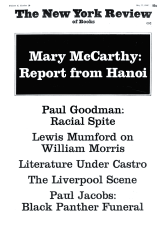In response to:
Poet of Unreason from the February 29, 1968 issue
To the Editors:
Granted that Mr. Weightman’s commentary on Artaud [NYR, Feb. 29] occasionally displays a casual eloquence, I feel that it is not at all a review. I won’t try to redo what Mr. Weightman has left undone, in part because his discussion points up how resistent, almost repellent Artaud’s works (most of which have for prologue the destruction of one or another system) are to categorization. And to debate “certifiable madness,” “an almost complete failure,” “pathological states” seems a wearying task. But I’d like to point out that everywhere in his article Mr. Weightman proceeds not from what Artaud wrote or did—of which the reviewer shows very little knowledge—but from what others thought of what Artaud wrote or did.
To be blunt Mr. Weightman’s view of “intellectual history” is contrary to the kind of penetration Artaud demands, and is inadequate in dealing with the prophecies of Artaud—or with Patchen’s Albion Moonlight, or with H. D.’s War Trilogy, to cite concurrent works, or with Blake, or with whatever visionary poem you might wish to name. Mr. Weightman is right about the renunciation of hermitism, to an extent (what Artaud rejects has been more usually titled Orphism), but Artaud’s move is to Dionysius, from herald or singer to participant. Artaud seems after primal states of consciousness, which he reaches through the gates of his “experience” and after a language that cannot be reduced or expanded beyond the terms employed. For these poetics (perhaps more than for those of a poet with whom Artaud felt great kinship), I would recommend the letter to Georges Lebreton, dated “Rodez, 7 March 1946” and recently translated by Robin Blaser as “Artaud on Nerval” (Pacific Nation I: 67-78); also, Artaud’s Pour en Finir avec le Jugement de Dieu.
I am curious to know why San Francisco, more precisely San Francisco of 1964-65 when Artaud Anthology was compiled and published, is so appropriate to Artaud. Finally, how has someone who has worked on Jean-Jacques Rousseau managed to miss the drift of Artaud, or might Mr. Weightman in that case also be a student of the criticism more than the author?
David S. Stevens Schaff
Berkeley, California
John Weightman replies:
I am sorry Mr. Stevens Schaff is not prepared to undertake “the wearying task” of definition and categorization, because it would be very interesting to see in operation the kind of penetration Artaud demands and to have his prophecies elucidated. But how can one say anything about him, if the language he was after “cannot be reduced or expanded beyond the terms employed”?
My “casual eloquence” was based on the complete works as published by Gallimard. I have seen many enthusiastic, incidental references to Artaud (like this letter by Mr. Stevens Schaff) but I have never come across any critical discussion of his dramatic theories or his poetry.
This Issue
May 23, 1968



